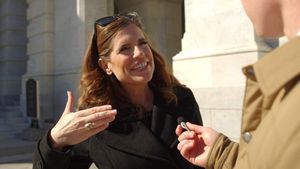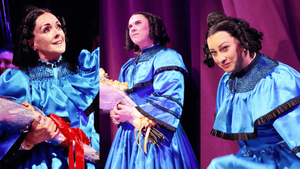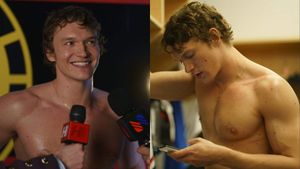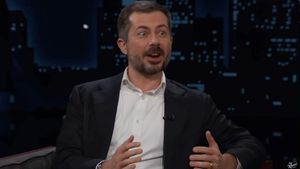All Rights reserved
By continuing to use our site, you agree to our Privacy Policy and Terms of Use.
Your support makes The Advocate's original LGBTQ+ reporting possible. Become a member today to help us continue this work.
One, two, three...everybody sing!
That's how my life has been occupied since late April, gentle readers. I've been privy to a superstar mezzo-soprano's divinity, an entertainment/society legend in living, heart-tugging action, and two of the opera world's most beloved treasures. For those of you not psychically gifted, let me elaborate: I'm talking about (in abovementioned order) worldwide opera star Susan Graham in recital, Kitty Carlisle Hart in a one-woman show of song and patter, and the Los Angeles Opera productions of Richard Strauss's Der Rosenkavalier and Giuseppe Verdi's Falstaff. I began this piece by ordering everyone to sing, but there's been so much to choose from that I'll have to cancel that request if I'm planning on hearing myself think. So take five, everybody. Have a sandwich--or a pretzel, at least. Oh, all that crunching is too noisy, Just read, will ya?
"Sister" act
I'm usually a pig about the women I want to hear on an opera stage. I want those coloratura sopranos, ladies who will be shaking my fillings loose with their roof-lifting high C's. But there's something about a mezzo-soprano in recital that works for me; as I was thrilled to hear Cecilia Bartoli in recital (well, who wouldn't be?) a couple of seasons back, so was I ecstatic to take my seat for the recital of mezzo superstar Susan Graham, one of America's bona fide singing treasures, a great favorite at the Metropolitan Opera and La Scala, just to mention two of the joints she's trilled in. Accompanied by pianist Malcolm Martineau, flutist Heather Clark, and cellist Rowena Hammill, Ms. Graham presented a program of songs from a great variety of composers, including such stalwarts as Francis Poulenc, Maurice Ravel, Hector Berlioz, Charles Ives, and Gustav Mahler. Some pieces were over, it seemed, in a few seconds--Poulenc's Quatre poemes d'Appollinaire, for instance--and then others caught fire and, with Ms. Graham's melodious, lustrous mezzo fanning the flames, she found herself engulfed in an inferno of dark and beautiful timbre. Her four selections from Mahler's Des Knaben Wunderhorn were particularly gorgeous, but then, I've always been partial to the sound of a woman singing (or just speaking) German. You don't believe me? Go listen to Tallulah Bankhead in Lifeboat, and then we'll talk.
Question: What do the two celebrated Susans--Graham and Sarandon--have in common? If you said Tim Robbins, I think that's wrong...but you're actually getting warm. After all, Mr. Robbins directed the film of Dead Man Walking, in which Ms. Sarandon appeared as Sister Helen Prejean, winning an Academy Award for her efforts. Some benighted few of you may not be aware that Sister Helen's book was also used as the underpinnings for an opera, composed by Jake Heggie, and our other Susan, the one we've been reviewing here, scored triumphantly in the same role that won Ms. Sarandon her Oscar. Performing The Deepest Desire: Four Meditations on Love, Ms. Graham hit her vocal and emotional heights and held on to them throughout this segment. She had explained to the audience that what she would be singing here were four arias from the opera, and could we please hold our applause for the entirety of this selection? Almost everyone in the packed Dorothy Chandler Pavilion heeded her request, although a few dumdums were obviously thinking about that cell phone call they'd just gotten from Pia Zadora (she never misses an opportunity to impinge on the proceedings at the Chandler, especially during a recital). And so they clapped after each aria, only to be vigorously shushed by their unfortunate neighbors. Those of us who were far enough away from the cell phones ringing and the bozos clapping were held in the palms of Ms. Graham's hands as she effortlessly cast a troubled nun's spell over the house. Lapsed Catholic or not, I was overwhelmed, and it took no deep thought to understand why Ms. Graham's performance in that opera was so royally hailed by the leading critics and magazine editors of the world. Her "hold your applause" request confused many, who thought she meant for the rest of the evening, so the clapping later on was intermittent and unworthy of such a talent.
After finishing up with her superb rendition of the Mahler pieces, Ms. Graham left the stage, allegedly for good, but we clapped her back for a few encores. She did three pieces: "A Chloris " by Reynaldo Hahn (new to me); the "Habanera" from Georges Bizet's Carmen (and what would a mezzo recital be without that warhorse?--but she gave it her all); and a song written specifically for her by a Broadway composer: "Sexy Lady" by Ben Moore, which ended the evening on a giddy spiraling of operatic in-jokes too numerous to mention, but containing some funny references to the mezzo's eternal entrapment in trouser roles--not, she sang, that it was such a big deal, all of this "kissing of chicks." Leaving the Chandler in a state of sonic exaltation worthy of Sister Helen herself, I found it easy to understand why Susan Graham was named Musical America's Vocalist of the Year 2004.
Zing! went the strings of her Hart
If you are old enough to remember the panel show To Tell the Truth (or have seen it on cable reruns), you may have noticed that one of the panelists, Kitty Carlisle, always looked as though she were just about to spend a night at the opera herself, so dressed to the, um, nines was she always. It so happens that Ms. Carlisle was actually a cast member of the 1935 Marx Brothers movie A Night at the Opera, and lo these 70 years later, this Kitty is still purring. She's about to turn 95, folks, and she got a big round of applause just for announcing that during her one-woman show, Here's to Life, which played to a jammed Geffen Playhouse audience on the west side of Los Angeles, practically in Santa Monica, it seemed. The names were out in force to spur Miss Kitty on. Standing on a stage decorated for a production of You Can't Take It with You, the '30s-era Pulitzer Prize-winning play cowritten by her late husband, Moss Hart, and some other guy named George S. Kaufman, Kitty presented herself in a shimmering French- vanilla ensemble to a house that included Mr. Kaufman's daughter, Tom Poston, Suzanne Pleshette, and Kevin McCarthy (of Invasion of the Body Snatchers--the original one--fame).
Kitty chatted us up and warbled (accompanied by David Lewis) a number of tunes--most effectively a tear-jerking "Something Wonderful" from The King and I and "September Song," that wrenching tune by Kurt Weill and Maxwell Anderson about the inevitability of the aging process. She sang songs by composers we've all read about, but it appears she knew them all: Sondheim, the Gershwins, Cole Porter, Irving Berlin, Rodgers and Hammerstein, Lerner and Loewe, and Jerome Kern, to name a sparkling handful. It's no wonder she was so charmingly effective as a society hostess in the film version of Six Degrees of Separation: Kitty Carlisle and Moss Hart got around, met simply everyone at least twice, and we're so very lucky that she's lived to sing and to tell the truth about it. Brava, diva!
Send me no flowers
When I first started getting serious about opera, I was listening to something (lord, don't ask me what it was!), and I said to my friend Pat that I loved the lushness of whatever opera it was that I had on the CD player. "So you like lush, do you?" Pat inquired.
"I adore it," I replied.
"Then you must get Der Rosenkavalier," Pat told me. End of argument.
At the time I was in the habit of scarfing up vinyl recordings of operas that people had sold after converting their collections to CDs, but upon Pat's command I found myself trotting my sweaty little buns up to the local Tower Records store and plunking down a tad more than $40 for the Elisabeth Schwarzkopf/Christa Ludwig recording of the Strauss comic opera (conducted by Herbert von Karajan), and Pat was right. I found myself immersed in a classical version of the lush life. On first listening, I was immediately overcome by the virtuosic climactic trio of the three sopranos (Teresa Stich-Randall being the third). And ever since then, I've been hooked on Strauss. Before that, my knowledge of him was limited to the soundtrack of 2001: A Space Odyssey, which used so effectively the opening of his renowned Also Sprach Zarathustra. But, starting with Der Rosenkavalier, there ain't been a Strauss opera that hasn't turned me to jelly.
So it was with more than a little excitement that I saw that one of the final two productions of the Los Angeles Opera's 2004-2005 season was going to be Der Rosenkavalier, directed by the Academy Award-winning actor Maximilian Schell, himself a native of Austria and so, I figured, a great fit for this musical treasure. With sets and costumes by Schell's fellow countryman, Gottfried Heinwein, lighting by Alan Burrett, choreography by yet another Austrian, Johann Kresnik, and conducting by the always marvelous Kent Nagano, the only things I worried about beforehand were 1) Who were the three sopranos going to be? and 2) What was Heinwein's interpretation of the look of the opera? If he did some sort of raffish mid-century Beverly Hills number, as Rigoletto was presented a few seasons back, I was going to take cyanide and place it under my tongue at the opening curtain.
Well, I needn't have worried, not about a thing. I can sum up my experience of this production of Der Rosenkavalier with one word: perfection. The cast could not have been more to my liking unless I could have gone back in time to the days when Frau Schwarzkopf was doing the role of the Marschallin, the aristocratic beauty who lusts, in her husband's absence, for the charms of the trouser-roled Octavian--but who knows that the young fellow will fall for someone more in his own age group. The Marschallin would be a good character to sing Kurt Weill and Maxwell Anderson's "September Song"--time, you see, is not on the Marschallin's side--but whose, exactly, is it on? In this production this pivotal role was played gloriously, if not to say regally, by Adrianne Pieczonka, the Canadian diva who has wowed audiences around the world with the, yes, lushness of her stunning soprano, a voice that can fill a room even with a whisper--and can take the roof off when she lets that voice rip up to the high notes. Her paramour, Octavian (the classic trouser role) was brought to stirring life by the British mezzo-soprano Alice Coote, and I have to say that when Ms, Coote was called upon to display heartfelt emotion with her singing (and, of course, her acting), our hearts felt it. A friend of the Marschallin's, the too-gauche-for-words Baron Ochs (the wonderful bass Kurt Rydl, still another Austrian) provided gratuitous (given Heinwein's sets and costumes) comic relief by generally being in the wrong color scheme for the three acts (Act One was blue, and Ochs was in yellow; Act Two was yellow, and Ochs was in red; whereas Act Three was red and so was Ochs, but by then he'd been made such a figure of buffoonery that he could have been perfectly costumed all along --here he had lost his wig--and still he would have had the stink of the ridiculous trailing around behind him.
In a blink of a summing-up narrative from yours truly, Baron Ochs has been promised, by Herr Faninal (baritone Robert Bork), the hand of his lovely daughter, Sophie, whose soprano rounds out the triumvirate of female vocalists elevating this opera into the stratosphere of perfection, Our Sophie was performed by Elizabeth Futral. Last seen here as Cleopatra in the countertenor-laden production of Handel's Giulio Cesare, Ms. Futral demonstrated that her high marks in that opera were no mere fluke; her singing as Sophie was beyond beautiful and, when Octavian, sent by Baron Ochs in Act Two to deliver a silver rose to Ochs's intended, was struck by love for the young miss and the two began to sing of their nascent feelings for each other, it was difficult to hold back the tears. All right, OK, it was impossible. I cried like a sissy. Sheesh!
Act Three is all about the dissolution of Baron Ochs's dreams of a happily-ever-after with Sophie and the Marschallin's stepping aside to let young love blossom properly, and it was a killer. Though the color scheme here was red, the Marschallin made her entrance in her signature blue, in a dress with hoops as wide as most people's dinning toom tables, and she was thoroughly majestic--especially to those of us who knew what was going to happen. After Ochs is chased offstage by a gaggle of Heinwein's most oddball, modern-day rococo characters, including a herd of his own children from a marriage that is not quite over, the three sopranos take deep breaths and launch into their celebrated trio, in which Octavian is vowing undying love for the beautiful (and appropriately young) Sophie, the glamorous but aging Marschallin is making way for the unforgiving march of time, and Sophie--well, Sophie is just overwhelmed by all that is transpiring. Thus begins one of the most celestial trios for sopranos in all of operatic history, and here it did not fail to pack a knockout punch. Mesdames Pieczonka, Coote, and Futral hit all the atmospheric highs one could ever hope for, and the Marschallin's final "Ja, ja" as she's being led offstage by Herr Faninal was as a dagger through the heart. Then Octavian and Sophie run through a duet reprise of the final melody, and all ends on that moment, one of the most happy/melancholy in all of opera. Down came the curtain, but the audience rose In a rapture of gratitude for the privilege of seeing a Der Rosenkavalier that can stand up to any, (and these once would have been fighting words) even the Schwarzkopf/Ludwig/Stich-Randall classic that gave me my first glimpse into the lush world of the opera of Richard Strauss.
A knight on the town
There are superstars and then there are mega superstars, and the celebrated Welsh bass-baritone Bryn Terfel falls into the latter category. He could fill a house and get a standing ovation for simply clearing his throat for an hour or two, so great is his charisma and so massive his talent. But his latest appearance at the Dorothy Chandler (he gave a recital to a packed audience last summer), in his Los Angeles Opera company debut, was in the title role of Giuseppe Verdi's final opera (and only comedy), Falstaff. Based rather closely on the Shakespearean lark The Merry Wives of Windsor, it is the story of a once-proud knight, Falstaff (he appears in other Shakespeare plays as well as The Merry Wives) who has grown not only old but fat and bald, and his appetites for food and spirits have grown along with his waistline. Rather, his waistline has burgeoned as a result of the growth of the other appetites, and in order to make himself some needed cash (because he's also grown indigent), he decides to compromise two of the wives of the richest burghers in Windsor, Alice Ford and Meg Page.
In as much costuming as would be necessary to play Star Wars' Jabba the Hut, Terfel nevertheless managed to convey all the emotions plaguing this aging fat hulk of a ravaged knight, and the physical comedy he was required to indulge in was worthy of the late John Candy, not that Candy could sing--at least not with the force of Mr. Terfel. Perhaps Candy could passably warble out a little ditty, I don't know; but Terfel's voice, on the other hand, sank right into the marrow of our bones with its awesome power and stirring beauty.
The merry wives, whom Falstaff is hoping to compromise (Kallen Esperian as Alice Ford and Milena Kitic as Meg Page, both faultless) prove more than a match for the old rapscallion, and so musically it behooves them to possess the vocal chops to stand up to Terfel without being bowled over, and this they accomplished. Aiding and abetting the Windsor wives is Mistress Quickly (mezzo-soprano Jane Heneschel, a USC grad who has sung simply everywhere), and it is Quickly who is put to use by the wives in order to entrap Falstaff in their own little bit of comic revenge. Meanwhile, the Fords have a daughter, Nannetta (the terrifically talented Celene Shafer), who is pledged to wed the old and unlovable Dr. Caius (tenor David Cangelosi) but who is secretly smitten with the Fords' servant, Fenton (tenor Daniil Shtoda). Nannetta and Fenton are forever sneaking off to a corner of the stage to exchange a few loving embraces, and nobody ever seems to notice this till nearly the opera's finish.
Falstaff himself is aided by a couple of cohorts, Bardolph (tenor Greg Feddery, very familiar to Los Angeles Opera audiences) and Pistol (bass Dean Peterson, a fairly regular performer at the Metropolitan Opera in New York), but the loyalty of these cohorts is questionable; perhaps they are waiting resentfully for some back pay. At any rate, they announce Falstaff's nefarious plans in the midst of the Ford household, and needles to say, the knight's schemes start to unravel then and there.
As I mentioned earlier, there is physical comedy galore, and this includes the poor old fatty's being hidden by the wives in a hamper of dirty linens, which is then dumped out the window into the river, and so one indignity after another plagues the knight. He's finally tricked into attending a masked revel in Windsor Park dressed as the Black Huntsman, where he's to meet Alice. So Falstaff shows up with antlers on his head and a huge cloak concealing (or trying to) his girth, but before he can have his moment with Mistress Ford, the entire company arrives, dressed as fairies and sprites. They are going to celebrate the wedding of the Fairy Queen, in this case Nannetta, to Dr, Caius, but a bit of mistaken identity ensues and Caius is wed to a disguised Bardolph, while Nannetta and Fenton have also joined the ceremony in masks, and so it is that they are wed. Papa Ford sees the writing on the wall and figures he can't undo what's been done, so while Dr. Caius has a sham marriage to Bardolph (there were simply no gay marriages at the time, not anywhere). Nannetta and Fenton achieve their heart's desire, and as for Faslstaff--well, once you've been made as ridiculous as he has, there's simply no way to regain a semblance of dignity. And besides, he still hasn't two farthings to rub together.
Directing comedy without becoming ham-handed is no mean feat, but Stephen Lawless, for several years the Director of Production for the Glyndebourne Touring Opera, handled the job expertly. (Working with such a cast couldn't have hurt,) Set designer Hayden Griffin, late of Sadlers Wells, created thoroughly charming sets; and British costume designer Michael Stennett clearly has this sort of material in his blood. Lighting designer Mark Jonathan, choreographer Peggy Hickey, and chorus master William Vendice all rose to the challenge of showcasing the superstar et al. to their best advantage. Last but certainly not least, Music Director Kent Nagano showed once again what a void he will create when he leaves the Los Angeles Opera for points east.
So that was the end of the 2004-2005 Los Angeles Opera season, but start saving your dollars now. There are treats in store for 2005/2006, and you'd be terribly remiss to stay away. Folks, attending the Los Angeles Opera is one of the great joys of my life, and I wasn't raised to like--and certainly not love--opera. But I do. And next season we have, among other delights to look forward to, Richard Wagner's Parsifal, Ruggero Leoncavallo's Pagliacci (in a truly eye-popping production directed by Franco Zeffirelli), Giiacomo Puccini's Tosca and Madama Butterfly, Wolfgang Mozart's Le nozze di Figaro, Giuseppe Verdi's La traviata, and a recital by mega superstar Cecilia Bartoli, among other tempting offerings. So do yourselves a favor. Get some culture, y'all.




































































Charlie Kirk DID say stoning gay people was the 'perfect law' — and these other heinous quotes